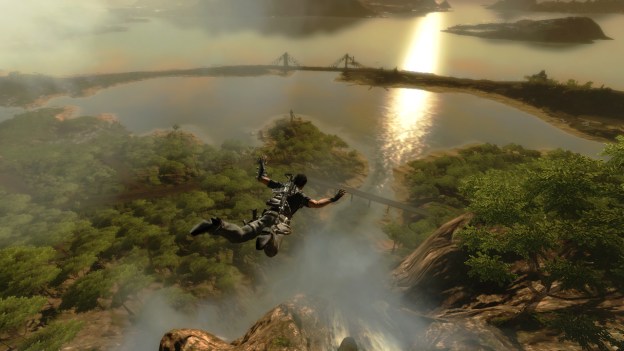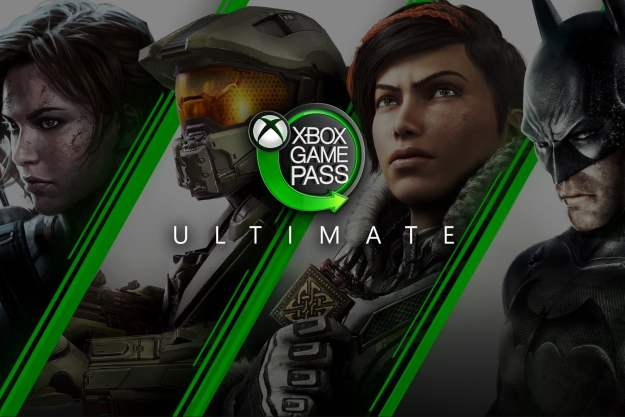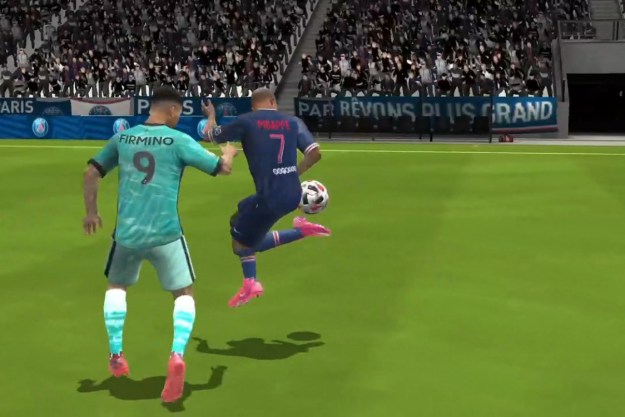
There’s a funny phenomenon among those who have played Just Cause 2: the game lingers. There’s always a pull in the world of big-budget games to move onto the next shiny thing, but Avalanche Studios’ highly destructible sandbox remains a fixture on many a gamer’s shelf and a fun diversion even now, just shy of three years after its release. An appreciation for open world, sandbox experiences is at the heart of the Avalanche ethos, as studio co-founder Christofer Sundberg told Digital Trends in a recent chat.

He goes on to tell us about an unannounced, now-cancelled project from some years back that presented the team with the challenge of creating a game with more of a linear progression. “It was actually almost like we were creating a new technology to start working on a linear game. Quick-time events were very popular at that time. This was a game that would never come out, but it changed the whole mindset of the studio and we ended up canceling that particular direction, that project, after a year. Our heart and soul is really in open world and sandbox.”
Sundberg founded Avalanche with his former Paradox Interactive chum Linus Blomberg in 2003, marking it as the second attempt for the pair after unsuccessfully trying to launch another studio in the preceding years. Avalanche was founded as a privately owned entity and continues to exist as such to this day. An unusual situation for a developer known for its AAA work to be in, particularly in this day and age. Financial independence wasn’t necessarily a fundamental goal, but that freedom does help to support the Avalanche vision as Sundberg and Blomberg conceived it.

“We have never had any external financing except for the regular publisher money [from individual projects]. We haven’t had the luxury of being distracted by other money than what we have from the projects that we’re developing. What we’ve had in the bank is what we’ve always had, and it’s probably made us what we are today in many ways. When you remove all of those distractions to focus on developing, a great game becomes bigger because you’re not focusing on anything else,” Sundberg explained.
“I think being somewhat uncomfortable is a strength with Avalanche.”
“If you’re not prepared to live with that risk, maybe running a development studio is not for you,” he said. “We have always been prepared to live with that risk, and we’ve taken our beatings from time to time. We’ve also shared a great deal of success with the release of new games. It’s more fun when you can control your own destiny. I think being somewhat uncomfortable is a strength with Avalanche. When we get comfortable, I’ve found us to become a bit lazy. We lose track of the ultimate goal, which is to create great sandbox and open world games.”

There’s nothing better for heightening a sense of professional discomfort than the uncertainty surrounding a new hardware generation. Avalanche is already thinking about what’s next, just like every other studio out there with even half a brain, but Sundberg thinks the the glitz and glamor of improved hardware is only a small part of what the next-gen really is. Making sure the studio’s future releases look “absolutely fantastic” is of course a goal that the engineers have set themselves to with the Avalanche engine. However, as Sundberg puts it, “any developer can make a really, really nice-looking game.”
“[High-end graphics are] not what makes a next-generation game interesting, to me at least,” he explained. “I think a next-generation game will be categorized by its use of alternate business models, how we approach an interesting DLC plan, getting free-to-play onto consoles… stuff like that. That would make them… truly next-gen. Then we add that layer of super high-res graphics on top of that. Special effects and destruction and all that stuff. I think in the beginning, everybody will feel that it’s absolutely fantastic, but in a year everybody will take it for granted. That’s when the real challenge of creating a next-gen game starts.”

“I’ve been working with games for 20 years now and I consider myself [to be] pretty experienced, but the last year or two after the industry hit the recession really hard, we’re seeing so many experts predicting what the future of this industry is,” Sundberg said. “I have a clue, but it’s not like I have the perfect recipe. You can look at [the previous work from] Avalanche as a decade of experimenting for this next-generation.”
“We’ve gone down all kinds of routes. The digital download, the big box, AAA development, the free-to-play that we do with Expansive Worlds on The Hunter. I think what we’re doing now is we’re combining all of those experiences as we go into the next-generation, and we learn from developing them and working with them firsthand rather than reading about them. So I think we’re pretty prepared.”
The ideal business model might elude Avalanche, as it does for so many others, but there’s one point that Sundberg is clear on: console gaming isn’t going anywhere. “I think the fortune-tellers and doomsday claimers that say ‘all consoles are dead, mobile games are the future’ [are wrong]. It’s kind of a dangerous [position to embrace] if you want to come off as believable. Seriously, they have no idea what they’re talking about.”

Sundberg points out that there really is no perfect recipe for financial success. You’re always going to see games that are big successes on one platform or another, you’re always going to see content that revolutionizes games, and you’re also always going to see substandard efforts that fall short in some fundamental way. Sundberg holds onto a strong belief that the horizontal spread of platforms and interface options is in no danger of narrowing.
“Personally, I’ve never seen Just Cause as a multiplayer game, but I was obviously proven wrong.”
How a game gets sold is an increasingly important concern, but content is still king. Avalanche is always open to evolving its efforts, as the extremely positive response to a recently released community mod that adds a massively multiplayer element to Just Cause 2‘s open world. “That completely came out of left field,” Sundberg said of the mod. “I think it’s fantastic. It has really helped the IP and it’s super inspiring for the future of that franchise.”

“Personally, I’ve never seen Just Cause as a multiplayer game, but I was obviously proven wrong. I would probably be thrown in the ocean in a bag with stones if I said that Just Cause was not a multiplayer game [at this point], because it is.” As much as the team enjoys seeing the mod in action, Sundberg and his Avalanche cohorts are also just as pleased to realize that there are still a ton of active Just Cause 2 players even now, three years after the game’s release.
“I haven’t really gotten the hang of [Twitter]. My tweets are all over the place. They can be anything from a vegan recipe to a picture of my daughter wearing a funny hat.”
“We’ll see,” he said. “They are obviously super talented and it would be great to do something with those guys in the future.”
For now, Sundberg is mostly concerned with keeping fans interested while not tipping his hand too much. The recent spate of tweeted images from his personal account speak to a desire to share more, but the realities of doing business in the games biz means that it’s hard to share much more than what we’ve already seen.

“Before the games are announced it’s really hard to say anything. We have some stuff in development that is not publisher-owned, so that’s easier to share,” he said. “I haven’t really gotten the hang of [Twitter]. My tweets are all over the place. They can be anything from a vegan recipe to a picture of my daughter wearing a funny hat.”
In the case of the apparent screenshots that Sundberg recently shared, he claimed at first that “there’s no deeper strategy in those tweets.” He stepped back a bit when pressed about that, since it’s clear that there’s some strategy in sharing images over Twitter as opposed to putting them up on a website. “It was kind of a test that I can’t really talk about,” he said, adding, “but we’ll do some announcements shortly I’m sure.”
For now, Sundberg just wants fans to bear with Avalanche as the various pieces fall into place. Asked if there’s a message he’d like to share with aficionados of Avalanche’s work, he said: “Please be patient. We won’t disappoint you, but it might be awhile before we can really share the greater details on things.” Will some have their doubts? Sure. And Sundberg is okay with that. “They’ll change their mind when they see what we’re working on.”


